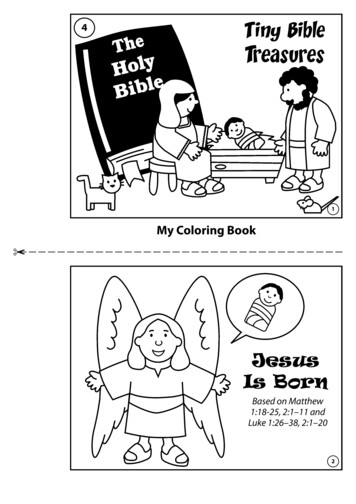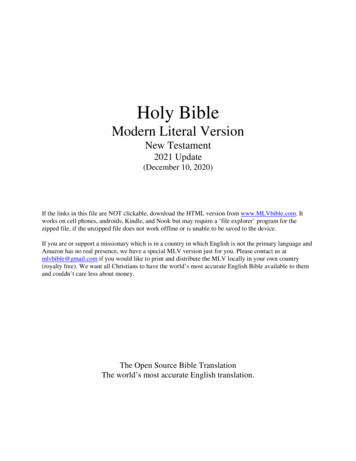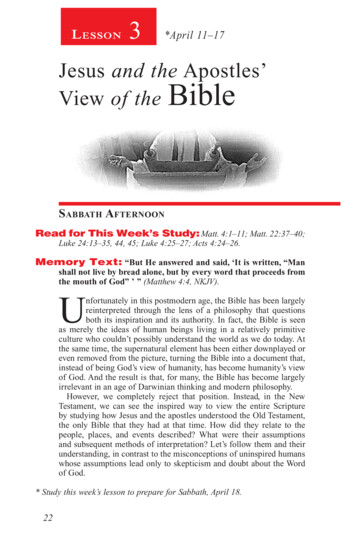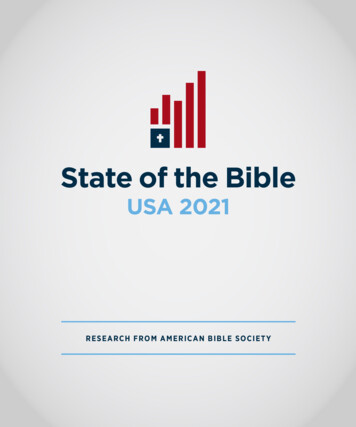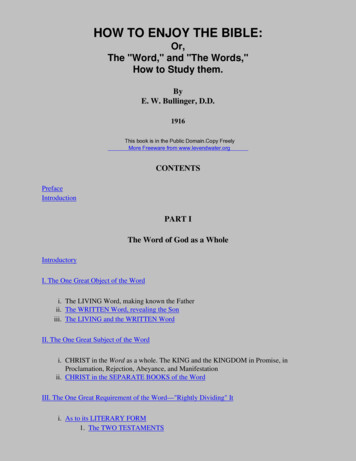
Transcription
HOW TO ENJOY THE BIBLE:Or,The "Word," and "The Words,"How to Study them.ByE. W. Bullinger, D.D.1916This book is in the Public Domain.Copy FreelyMore Freeware from www.levendwater.orgCONTENTSPrefaceIntroductionPART IThe Word of God as a WholeIntroductoryI. The One Great Object of the Wordi. The LIVING Word, making known the Fatherii. The WRITTEN Word, revealing the Soniii. The LIVING and the WRITTEN WordII. The One Great Subject of the Wordi. CHRIST in the Word as a whole. The KING and the KINGDOM in Promise, inProclamation, Rejection, Abeyance, and Manifestationii. CHRIST in the SEPARATE BOOKS of the WordIII. The One Great Requirement of the Word—"Rightly Dividing" Iti. As to its LITERARY FORM1. The TWO TESTAMENTS
2. The SEPARATE BOOKS3. The Division of the Hebrew Texta. Into open and closed Sectionsb. Into Sedarim or Triennial Pericopesc. Into Parashioth or Annual Pericopes4. The DIVISIONS of the GREEK TEXT5. The Divisions of the VERSIONS, AND THE ENGLISH BIBLEa. Into Chaptersb. Into Versesc. The Chapter-Breaksd. The Headings of Chapters and Pagese. The Punctuation1. Changes in Edition of 1611 to be preferred to later Editions2. Changes in later Editions which are improvements on the 16113. Changes now proposed as most desirablef. Parenthesesii. As to its SUBJECT MATTER1. The JEW, the GENTILES, and the CHURCH of God2. The GENTILES3. The EPISTLES to the DISPERSIONa. Jamesb. Hebrewsiii. As to its TIMES and DISPENSATIONS1. The Word "DISPENSATION"2. The SEVEN Dispensationsa. The Edenic (Innocenceb. The Patriarchal (Theocratic)c. Israelite (Past)d. The Ecclesia (Grace)e. Israelite (Judgment)f. Millennial (Theocratic)g. Eternal (Glory)3. Their SPECIAL CHARACTERISTICSa. Man's condition in eachb. The Crisis in each4. The "TIMES OF THE GENTILES"5. The PARENTHESIS of the PRESENT DISPENSATIONiv. As to its DISPENSATIONAL TRUTH and TEACHING
1. One part of the PAST not necessarily to be read into another part of the PASTa. Matthew 10:5, 6; and 28:19, 20b. Luke 9:3; and 22:35, 362. The PAST not to be read into the PRESENTa. Law and Graceb. The Imprecatory Psalmsc. The Sabbathd. The Kingdome. The Gospelsf. The Sermon on the Mountg. The Lord's Prayerh. The Priesthoodi. Baptismsj. The prophecy of Amos. Amos 9:11, 12. Acts 15:14-18k. The title "Son of Man"3. The PRESENT not to be read into the PASTa. The Mysteryb. "Sons of God"c. The "Church"4. The FUTURE not to be read into the PRESENTa. The Great Tribulationb. The 144,000c. Sundry Prophecies: Psalm 2; Isaiah 2; Isaiah 60d. The Day of the Lord5. One part of the FUTURE not necessarily to be read into another part of theFUTUREa. The Adventsb. The Resurrectionsc. The Judgments1. 2 Corinthians 5:102. Matthew 25:31-363. Revelation 20:11-156. The Truth and Teaching of the CANONICAL ORDER to be distinguished fromthe CHRONOLOGICAL AND HISTORICAL ORDERa. The Tabernacleb. The Great Offeringsc. The Four Gospelsd. 1 Samuel 16-18e. The Book of Jeremiahf. The Pauline EpistlesPART II
The WordsIntroductoryI. The Meaning of Words to be Gathered from the Scope; not the Scope from the Wordsi.ii.iii.iv.v.2 Peter 1:20, "Private interpretation"1 Peter 3:20, "Spirits in prison"Hebrews 9:16, 17, "Testament" or "Covenant"Genesis 24:63, "Meditate"Revelation 1:10, "The Lord's day"II. The Scope of a Passage to be Gathered from its Structurei.ii.iii.iv.v.IntroductoryThe PRINCIPLES governing the Structure of ScriptureEXAMPLES of each principleThe ADVANTAGES and importance of the StructuresILLUSTRATIONS of these advantages1. 2 Peter 1:16-21, "Private interpretation"2. 1 Peter 3:18-22, "spirits in prison"3. Hebrews 9:15-23, "Testament" and "Covenant"4. 2 Corinthians 5:1-5, "absent from the body"III. The Biblical Usage of Words Essential to their Correct Interpretationi. Where ENGLISH WORDS have gone OUT OF USE altogether1. All to brake2. Away with3. Come at4. Do to-wit5. For to do6. Full well7. Go to8. Trow9. Wist10. Veryii. Where the usage of ENGLISH WORDS has become CHANGED1. Prevent2. To take in3. Adventure4. Artillery5. Assay
6. By and By7. Charity8. Beeves9. Bonnet10. Carriages11. Clouted12. To ear13. Earnest14. Fast15. Libertine16. Lusty17. Naughty18. Nephew19. Occupy20. Penny21. Presently22. Publican23. Quick24. Quicken25. Quickened26. Quickeneth27. Quickening28. Simple29. Simplicity30. Sottish31. Vagabond32. Sillyiii. Where the USAGE OF GREEK WORDS had become changed1. By God:a. αρετη (arete), praiseb. ηθος (ethos), mannersc. αγγελος (angelos), angeld. χορηγεω (choregeo), supplye. εκκλησια (ecclesia), churchf. παρακλητος (parakletos), comforter, advocateg. σκανδαλον (scandalon), offence2. By man:a. ζωοποιεω (zoopoieo), quickenb. παροικος (paroikos), neighbourc. πρακτωρ (praktor), officerd. πηρα (pera), scripe. πρεσβυτερος (presbuteros), elderf. αναγινωσκω (anaginosko), persuade
g. αποστοµατιζω (apostomatizo), questionh. γραφω (grapho), wrotei. απεχω (apecho), rewardj. βεβαιωσις (bebaiosis), confirmationk. το δοκιµιον (to dokimion), triall. δικαιος (dikaios), righteousm. ιλαστηριον (hilasterion), propitiationn. ευεργητης (euergetes), well-doero. πληθος (plethos), multitudep. µικρος (mikros), littleq. παραδεισος (paradeisos), paradiser. κυριακος (kuriakos), Lord'ss. χειρογραφον (cheirographon), handwritingt. αδολος (adolos), sincereu. σφραγιζω (sphragizo), sealv. χαραγµα (charagma), markw. αναπεµπω (anapempo), sendx. βιαζοµαι (biazomai), suffer violence, pressy. κατακριµα (katakrima), condemnationz. υποστασις (hupostasis), substanceiv. Where DIFFERENT but CONCURRENT USAGES OF GREEK WORDS should beobserved in the English1. Parousia2. Pneuma3. Church4. Elements and Rudiments5. Saintsv. Where a UNIFORM USAGE OF GREEK WORDS should not be departed from in theEnglish1. Withhold2. Temptation3. Poor4. Paradise5. Sheol and Hades6. Mystery7. "At hand"8. "Depart"9. LeavenIV. The Context Always Essential to the Interpretation of Wordsi. The IMPORTANCE of the CONTEXT shownii. Illustrations of ERROR arising from a DISREGARD of the Context
1. Isaiah 52:8, "They shall see eye to eye"2. Habakkuk 2:2, "That he may run that readeth"3. Psalm 2:8, "Ask of Me"4. Matthew 22:32, "The God of the living"5. Matthew 23:3, "That observe and do"6. John 6:37, "Him that cometh"7. Acts 16:31, "Believe.and thou shalt be saved"8. Romans 8:28, "All things work together for good"9. 1 Corinthians 3:17, "Him shall God destroy"10. 2 Corinthians 5:8, "Absent from the body"11. Philippians 1:21, "To die is gain"12. Philippians 2:12, "Work out your own salvation"13. Text-Mangling14. Text-Garblingiii. Illustrations of TRUTH AND TEACHING resulting from a DUE REGARD to theContexta. The NEARER CONTEXT1. Genesis 35:2 and 34:26-29, "Put away the strange gods"2. 2 Kings 4:13 and 3:16, 17, "Wouldst thou be spoken for to the King"3. Daniel 5:30, 6:1; and Esther 1:1-3, "The 120 and 127 Provinces"4. Ephesians 3:15 and 1:21, "The whole family"b. The REMOTER CONTEXT1. Genesis 19 and 14, The cities and the city2. Genesis 24:24, and 18:11, 12, Rebekah the daughter of Bethuel3. Genesis 37:25, 28, 36; and Judges 6-8, The Ishmaelites and Midianites4. Exodus 6:16-20; and Numbers 26:59, Moses' parents5. Numbers 16:1; and Numbers 3:29, 2:10, The sons of Kohath6. Numbers 16:27; and Numbers 26:11, The sons of Korah7. Joshua 3:15, 4:19; and Exodus 11:31; Joshua 2:6, Jordan overflowingin time of harvest8. 1 Samuel 13:19; and Judges 3:16, 31, 5:8, 14:5, 6, No smith found inIsrael9. 1 Samuel 17:4; and Joshua 11:21, 22, Goliath of Gath10. 1 Kings 17:9, 12 and Joshua 19:2811. 2 Chronicles 17-24; and Joshua 21:13, "Jehoshaphat strengthenedhimself against Israel"12. 2 Chronicles 22:11, 12, and 24:7, Joash, Jehosheba, and nurse13. 2 Chronicles 21:10; and Joshua 21:13, The revolt of Libnah14. 2 Kings 18:13-16; and Isaiah 39:2; 2 Chronicles 32:22, 23, Thedepletion of Hezekiah's treasury15. Isaiah 62:2-5; and 2 Kings 21:1, The land shall be called Hephzibah16. Jeremiah 13:18; and 2 Kings 24:12, 15, "Say unto the Queen"17. Mark 14:51, 52; and John 12:10, The young man who fled fromGethsemane
18.19.20.21.22.23.John 21:15; and Matthew 26:31, 33, "Lovest thou Me more than these"Acts 2:16; and Joel 2:28-32, "This is that"1 Corinthians 11:10; and Genesis 6:1, 3, Power on her headGalatians 3:15-17; and Genesis 15; Acts 7:6, The 400 and 430 yearsGalatians 3:20; and Genesis 15:12, "God is one"Hebrews 12:17; and Genesis 27:34-38, "No place of repentance"V. The First Occurrence of Words, Expressions, and Utterances Often Essential to theirInterpretationi. WORDS:1. "Prophet" (Gen 20:7)2. "Hallelujah" (Psa 104:35)3. "Selah" (Psa 3:2,3)4. "Jerusalem" (Judg 1:7,8)5. The Spiritual significance of Numbers6. The Divine Names and Titlesii. EXPRESSIONS:1. "The Son of Man" (Psa 8)2. "The Man of God" (Deut 33:1)3. "The Day of the Lord" (Isa 2:11,17)iii. UTTERANCES:1. The first utterance of the Old Serpent (Gen 3:1)2. The first ministerial utterance of the Lord (Matt 4:4)3. The first utterance of the Lord as Son of Man (Luke 2:49)4. The first Questions in the Old and New Testaments (Gen 3:9; Matt 2:2)5. The first interpretation of prophecy in the New Testament (Isa 7:14; Matt1:22,23)VI. The Place Where a Passage Occurs is Often Essential to its Full Interpretation1. "All Scripture given by inspiration" (2 Tim 3:16)2. "Come unto Me" (Matt 11:28)3. "Anathema, Maranatha" (1 Cor 16:22)VII. No One Passage to be Interpreted in a Sense Repugnant to Others that are Clear1. The rich man and Lazarus (Luke 16:19-31)2. "Destroy not thy weak brother with thy meat" (Rom 14:15; and 1 Cor 8:11)VIII. The Importance of Accuracy in the Study of the Words of Scripturei. In THE REMOVAL OF ERRORS
1. Ammonite or Moabite (Deut 23:3; and Matt 1:5)2. Zedekiah and Babylon (Jer 32:4, 34:3; Eze 12:13; and 2 Kings 25:6,7)3. Omer and Homer (Exo 16:36; and Eze 45:11)4. The going of Balaam (Num 22:22)5. God's Command concerning Sacrifices (Jer 7:22,23; and Lev 1:3)6. Hearing and not hearing the Voice (Acts 9:7 and 22:9)7. Standing, and Falling to the earth (Acts 9:7 and 26:14)8. Spoken and written (Matt 2:23)9. "Jeremiah the prophet" (Matt 27:9)10. The sending of the Centurion (Luke 7:3,6; Matt 8:5)11. The inscriptions on the Cross12. The offering of drink on the Cross13. The "others" crucified with Christ14. The burying of Jacob and his sons (Acts 7:15-17)ii. In the REVELATION OF TRUTH1. Words and Expressions:a. "From above" (Luke 1:3)b. "Another King" (Acts 7:17)c. "The world that then was" (Gen 1:1,2)d. The mention of the "blood" in 1 John 1:7 and 2:1e. "Accepted" and "Acceptable" (Eph 1:6; and 2 Cor 5:9)f. "Man" and "Men"g. Remembering and Forgetting2. The OPPOSITE of what is saida. "Out of the Scriptures" (Acts 17:2)b. "Waiting for God's Son" (1 Thess 1:9)c. "Except there come the Apostasy" (2 Thess 2:3)3. MARKS OF TIMEa. "The second day" (Josh 10:31,32)b. "Then came Amalek" (Exo 17:8)c. "Then will I sprinkle" (Eze 36:25)d. "Then shall the offering" (Mal 3:4)e. "Then they that feared the LORD" (Mal 3:16)f. "Then we which are alive" (1 Thess 4:17)g. "Then shall the kingdom of heaven" (Matt 25:1)h. "Immediately" (Matt 24:29)i. "Afterward" (Joel 2:28)j. "At that time" (Matt 11:25)4. MARKS OF REASONINGa. "Therefore, I beseech you" (Eph 4:1)b. "Therefore I charge you" (2 Tim 4:1)5. NUMERATIONa. 50,070 (1 Sam 6:19)b. 42,000 (Judg 12:6)c. The Census of Numbers 1 and 36
6. NAMES OF PERSONS AND PLACESa. Of PERSONS1. The same Name borne by different Persons2. The same Person bearing different Names3. Changes in Names4. The Divine Namesb. Of PLACES1. The same Name given to different Places2. The same Place called by different Names7. CHRONOLOGYa. The 120 years of Genesis 6:3b. The 400 years of Genesis 15:3 and Acts 7:6c. The 430 years of Exodus 12:40 and Galatians 3:17d. The 450 years of Acts 13:20e. The 490 years of Daniel 9:27f. The 480th year of 1 Kings 6:18. SYNONYMOUS GREEK words9. SYNONYMOUS HEBREW words10. The GENITIVE CASEa. The Genitive of Characterb. The Genitive of Originc. The Genitive of Possessiond. The Genitive of Appositione. The Genitive of Relationf. The Genitive of the Materialg. The Genitive of the Contentsh. The Genitive of Partitioni. Two Genitives: one dependent on the otherIX. Figures of SpeechX. Interpretation and Application1.2.3.4.5.The account of Creation (Gen 1)The Rejection of Messiah (Isa 53)The mourning of Israel (Rev 1:7)The Potter's house (Jer 18)The Ten Virgins (Matt 25)XI. The Limits of InspirationXII. The Place of Various Readings
1.2.3.4.The Hebrew MSS of the Old TestamentThe Greek MSS of the New TestamentThe Ancient VersionsThe Printed Greek Text of the NTConclusionIndex of SubjectsIndex of Texts Explained
Back Contents ForwardHow To Enjoy The BibleE. W. Bullinger1916PrefaceIt will add greatly to the interest of this work if I briefly describe the circumstances to which,under God, it owes its origin. Nothing will so clearly show its aim and object, or so well explainits one great design as embodied in its title: How to Enjoy the bible.In the autumn of 1905 I found myself in one of the most important of the European Capitals. Ihad preached in the morning in the Embassy Chapel, and at the close of the service, my friend,His Britannic Majesty's Chaplain, expressed his deep regret at the absence of two members ofhis congregation, whose disappointment, he said, would be very great when they discoveredthey were away on the very Sunday that I was there.As it was a matter which I could not possibly alter I was compelled, perforce, to dismiss it frommy mind with much regret, and returned to my hotel.In the afternoon a visiting card was brought to my room, announcing a gentleman holding a highGovernment position.In explaining the object of his visit he began by saying that he had been brought up as a RomanCatholic; and that, a few years ago, there came into the office of his department a copy of TheIllustrated London News. As he was learning English at the time, he was naturally interested inreading it. The number contained an account of the funeral of the late Charles
E. W. Bullinger, D.D. 1916 This book is in the Public Domain.Copy Freely More Freeware from www.levendwater.org CONTENTS Preface Introduction PART I The Word of God as a Whole Introductory I. The One Great Object of the Word i. The LIVING Word, making known the Father ii. The WRITTEN Word, revealing the Son iii. The LIVING and the WRITTEN Word II. The One Great Subject





